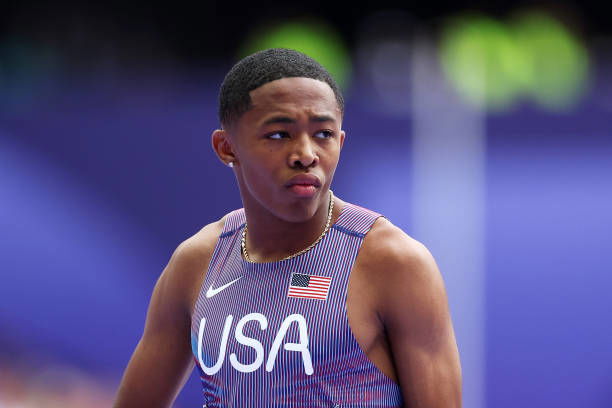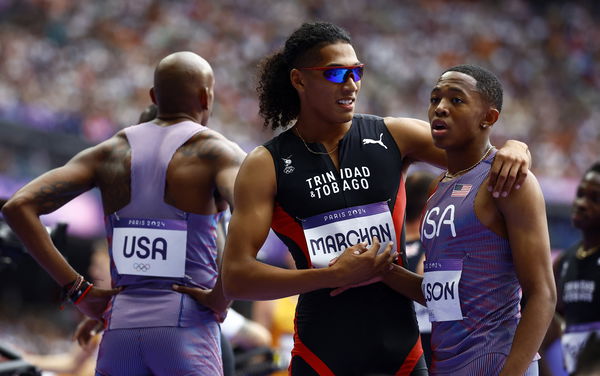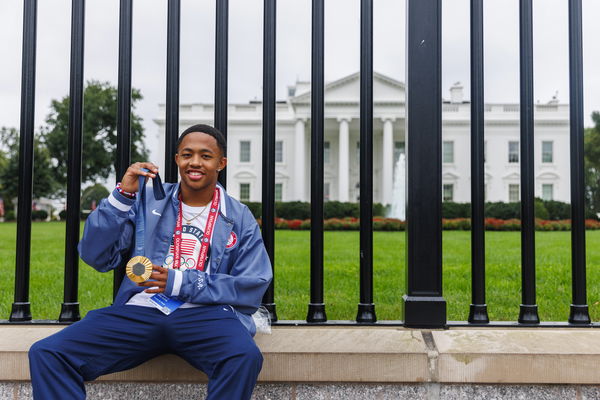
Getty
Quincy Wilson during the Men’s 4 x 400m Relay Round 1 of the Olympic Games Paris 2024 at Stade de France. (Credit- Getty Images)

Getty
Quincy Wilson during the Men’s 4 x 400m Relay Round 1 of the Olympic Games Paris 2024 at Stade de France. (Credit- Getty Images)
“This was a dream come true,” Quincy Wilson said with joy after competing in the opening round of the men’s 4x400m relay at the Paris Olympics, where he joined forces with Vernon Norwood, Bryce Deadmon, and Christopher Bailey. The squad secured third place in Heat 1 at the Stade de France. Still, the teenage sensation wasn’t fully satisfied with his performance. “I didn’t run my best, but I knew I had a great team on my hands. I wasn’t nervous, I was 100% myself,” he reflected. Was it the pressure of the grand stage? Hard to say. What’s certain is that Quincy had to navigate a hard road to get to the Olympics—something he’s only recently begun to open up about.
Watch What’s Trending Now!
It’s only natural to consider how intense the competition is at the U.S. Olympic Track and Field Trials. For Quincy Wilson, that intensity was amplified—at just 16 years old, he was up against some of the nation’s top stars, fighting for a spot. But beyond the external pressure, there was another challenge—one that came from within. During his appearance on The Parker Valby Show, Quincy spoke candidly about it.
ADVERTISEMENT
In his conversation with fellow Olympian Parker Valby on her podcast from June 28, Quincy Wilson admitted, “I had no plans on going to the Olympics, that wasn’t even that wasn’t a plan.” Yet, back when he was just 13—during the Tokyo Olympics—he had already started dreaming about one day competing on that stage. Fast forward to 2024, and that dream became reality as the teenage prodigy earned his spot on Team USA and boarded the flight to Paris. So, what was holding him back?

Reuters
Paris 2024 Olympics – Athletics – Men’s 4 x 400m Relay Round 1 – Stade de France, Saint-Denis, France – August 09, 2024. Jaden Marchan of Trinidad & Tobago and Quincy Wilson of United States reacts after competing in heat 1. REUTERS/Sarah Meyssonnier
The Chesapeake native explained, “I was just like I’m going to go out here and compete against the pros and see what I do like it was just like a see what I test trial in a test trial.” For Quincy, the Olympic Trials were more of a rehearsal, a way to gauge where he stood before officially entering the senior ranks. Before the U.S. Olympic Track and Field Trials, he hadn’t had much experience racing against elite-level athletes. Still, in the 400m semifinals, he made headlines by breaking the age-group record with a stunning 44.59 seconds. Despite that, he placed sixth and didn’t advance to the final, which meant he wouldn’t compete individually in the 400m at the Paris Olympics.
ADVERTISEMENT
Even so, Quincy was handed a major responsibility in the relay squad—and instead of rushing in, he chose to take a steady approach, giving himself seven days to ease into it and evaluate everything.
ADVERTISEMENT
Fortunately, success found its way to the young prodigy. In Paris, the U.S. men’s 4x400m relay team captured the gold medal, and Quincy proudly earned his share of the glory. It was a well-deserved reward for the challenges he had overcome. But that wasn’t the end—there were still more honors waiting for him.
ADVERTISEMENT
Quincy Wilson earns the gems as his prize
At just 16, Quincy Wilson was already living a dream most athletes only imagine. During the opening ceremony of the Paris Olympics, he found himself posing alongside none other than LeBron James and Coco Gauff, the captains of Team USA—a moment that felt straight out of a fantasy. But Quincy’s unforgettable summer was just getting started.
After the Games, former NFL safety Ryan Clark introduced him to none other than Jay-Z at an exclusive party. Despite the surrounding buzz, the music mogul took time to talk with the young star—a gesture that left Quincy stunned and even had his coach half-joking that he was jealous of his protégé’s rapid rise to fame.
ADVERTISEMENT

Imago
White House US Olympian and Paralympian Celebration Olympic Gold Medalist Quincy Wilson poses with his gold medal in front of the White House on Monday, September 30, 2024 in Washington, District of Columbia. President Biden hosted the US Olympic and Paralympic athletes for a celebration on the South Lawn. Washington District of Columbia United States Copyright: xAaronxSchwartzx
By then, Quincy’s place in the U.S. Olympic men’s relay pool had become a certainty, and the world was taking notice. NBA legend Magic Johnson invited Quincy and his family to watch a Washington Commanders game from his private owner’s suite. Deion Sanders gave him a Twitter shoutout. Even before the Olympics, Quincy had been rubbing shoulders with sports royalty—attending a lavish seafood dinner in Baltimore, where he cracked crabs alongside stars from the Ravens and Orioles. So, for a teenager who once saw the Olympic Trials as just a “test run,” Quincy Wilson was now passing every test—and turning heads far beyond the track.
ADVERTISEMENT
ADVERTISEMENT
ADVERTISEMENT
ADVERTISEMENT